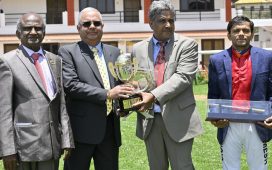E.S. “Rusty” Ford, equine operations consultant to the Kentucky Office of the State Veterinarian, released the following update regarding EHV-1 in the state Friday:
Results of the PCR testing conducted on samples collected Thursday were reported Thursday evening and did identify five additional EHV-1 positive horses (neuropathogenic strain). Two of the horses had been previously moved to the separate isolation barn and we did relocate the additional three positive horses to isolation last night as well. With the five additional positive horses, our population of potentially exposed horses grew and samples are being collected and submitted from each of those 25 horses later this afternoon with results expected to be available over the weekend.
We appreciate the commitment, effort, and resources Blackwood’s management, horse owners, horsemen and attending veterinarians have provided. Biosecurity and health monitoring protocols that include temping horses multiple times daily have and will continue to be practiced by horsemen at Blackwood. These same procedures and protocols have been adopted and are routinely practiced by other training venues as well. State animal health officials and attending veterinary practitioners are working together and following up with testing of any horse suggesting evidence of an infectious condition. These combined efforts have helped us identify affected horses, thus better enabling us to mitigate further transmission and aide our ability to ensure we have safe and healthy environments for our horses and horsemen to continue normal operations within the commonwealth.
Index Case Update: Following a period of stability, the index case rapidly deteriorated and has been euthanized.
Other Guidance: Clearly, with the multiple ongoing EHV-1 events involving multiple breeds, disciplines, and venues, farms accepting new arrivals are to be reminded the importance of knowing the environment and status of where the horse arriving their farm originated and implementing needed husbandry practices that should include isolation, observation and assessment of the horse to insure healthy horses are introduced to your herd.
While our investigation of the Kentucky event as well as monitoring of disease events in other states continues, Kentucky State Veterinarian Dr. Katie Flynn and I will be providing further updates as information becomes available.
New to the Paulick Report? Click here to sign up for our daily email newsletter to keep up on this and other stories happening in the Thoroughbred industry.
Copyright © 2021 Paulick Report.








